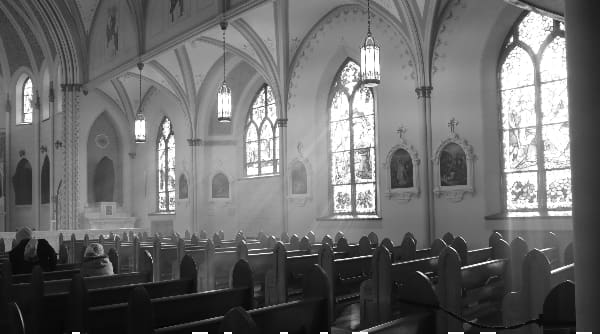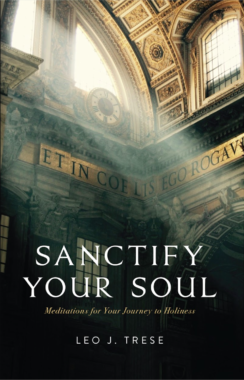I Believe
Kneeling before the tabernacle, it seems quite natural to begin my period of prayer with an act of faith: “I do believe, my Jesus, in the reality of Your presence here.” Just then an unexpected voice intrudes itself upon my pious reflections. Perhaps it is my guardian angel who asks, “Oh, you believe, do you? Just how strong is your faith, anyway? Have you examined it lately?” It is a disturbing question.
Obviously, my love for God will be no more ardent than my faith is strong. I cannot love anyone unless first I know him. It is by faith that I impress upon my mind the image of God that elicits my love. The more vivid that image is, the more ardently must my will respond to the infinite lovableness that the image presents. If logic has any validity at all, this sequence of love-follows-faith is unalterably true.
My love for God is quite simply gauged. It is measured by the completeness with which my own will is coterminous with His. However, as I look back through yesterday and today, I can see all too plainly that my planning, my choices, and my decisions have sprung far more often from my own preferences and attachments than from any consideration for God’s will.
It is not so much that I have deliberately opposed God’s will; that would mean sin and the total eclipse of love. It rather is that I just haven’t thought about God and His possible interest in what I am doing or projecting to do. My personal concept of God simply isn’t powerful enough to cut through the magnetic field of my own selfinterest. What-God-wants doesn’t dominate my behavior because what-God-is doesn’t dominate my mind.
This brings me to a rather shocking conclusion: my faith isn’t as strong as I thought it to be. I always have felt quite comfortable about my faith. My weakness in other virtues I have quite readily admitted to myself. I haven’t hesitated to pray for greater humility, patience, purity, charity, and zeal. Now I suddenly perceive a weakness in the very foundation on which all these others must be built. I have committed the unpardonable fault of the logician: I have devised the syllogism of my life upon an unproved major premise
It is urgent, then, that I rouse myself from the comforting illusion that my faith is strong and impregnable. I must stir up in myself the grace of Baptism—that “grace to believe” that came to me at the font. I must reactivate the grace of Confirmation—that “grace to understand” that the bishop’s outstretched hands invoked upon me. I have let myself forget my continuing need for the special graces of these sacraments. Baptism and Confirmation are for children and neophytes—so has run my unconscious reasoning. Like a northerner who moves to the tropics and leaves his heavy clothes behind, I have moved on to a sunnier spiritual climate; Baptism and Confirmation long since have served their purposes. So I thought, and in so thinking was never so wrong.
Above all, I need to draw more deeply upon the grace of Holy Orders—what I might call the “grace to grow.” I must grow in all aspects of perfection, but most especially I must grow in faith, since all else depends upon this. Ashamedly, I recall the almost terrifying faith of my first Mass, when my hands trembled so that I dropped half the broken Host into the Precious Blood. Making all due allowance for the numbing effects of repetition, shouldn’t there have been some remnant of that faith in my Mass today, instead of my having to pause for a moment to ask myself, “Did I consecrate the chalice?”
Not only for my own enrichment but by virtue of my office I must grow in faith. It is by the faith of Peter that the whole world shall be confirmed in faith. But it is in me, or not at all, that the faith of Peter must be made manifest to the little flock that is my segment of the world.
Truly, I do need to remember that the sacrament of Holy Orders gave me an absolute right to the grace of growth. Freely but irrevocably, God bound Himself to give me, on demand, whatever graces I might need for growth in the faith that fosters virtue and priestly fruitfulness. In this, God has made Himself my servant. I have only to request, with sincerity, whatever graces I may need, and God will obey. He denies Himself the right to deny me. What countless times, I wonder, have I left grace untouched in God’s hands outstretched to me, graces that were mine by right and mine for the asking? But I did not ask; I did not even advert to my need.
Perhaps my blindness was not wholly indeliberate. The graces are mine for the asking; but to ask with sincerity means that I stand ready to add my own tiny ingredient of effort to God’s abundance. It is little that I must add; yet I hesitated, perhaps, at the thought of where that little might lead. Like a suspicious hound, I sniffed a hint of sacrifice, a mite of possible pain in God’s proffered hand. I have not dared to let myself take too seriously all the implications of God’s love for me and of my own vocation to love, to detachment, and to an all-consuming zeal for souls. It has been so much safer to keep the fire banked, so much less disturbing to be content with “just a little” faith.
How now shall I answer this brash and unwelcome voice that has asked, “Just how strong is your faith?” In my discomfort, I shall use a legal dodge and shall plead for a continuance of my case. In the meantime, I can get to work to prepare my defense. Hereafter, as I swing out of bed in the morning, I shall begin each day with an act of faith just as thoughtful and earnest as I can make it. In my preparation for Mass, the emphasis will be on a pledge of faith and a plea for faith. If there is a Credo in the Mass, I shall put my heart into it as a welcome opportunity for renewed allegiance, instead of viewing it as an unwelcome prolongation of the rite. At the Consecration, above all, I shall try to make myself the very incarnation of “I believe!” as I pronounce my “Hoc est enim.
The Creed of my Rosary, so long seen as merely a conventional introduction to my beads, shall now be a petition to God for a growth in the faith that I have for so long so thoughtlessly avowed. Also I shall step up my spiritual reading, my much-too-sketchy spiritual reading, in the hope that God’s image and God’s will may become more sharply defined in my mind and heart. And each time during the day that I pause to make a choice or a decision, I shall try very hard to remember to ask myself not, “What do I want to do?” but rather, “What would God want me to do?” And I shall pray for the courage, when courage is needed, to accept the answer that faith spells out.
It will not be easy. My progress, I suspect, will be slow. But I will, I will try to become what I, above all other humans, ought as a priest to be: a man of faith. “I do believe, O Lord! Help Thou my unbelief!” (Mark 9:23).
+
This article on how to enter the narrow gate is adapted from a chapter in Sanctify Your Soul by Fr. Leo J. Trese which is available from Sophia Institute Press.
Art for this post: Cover and featured image used with permission.





